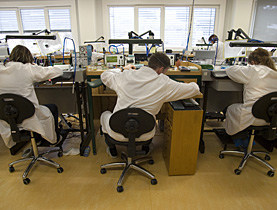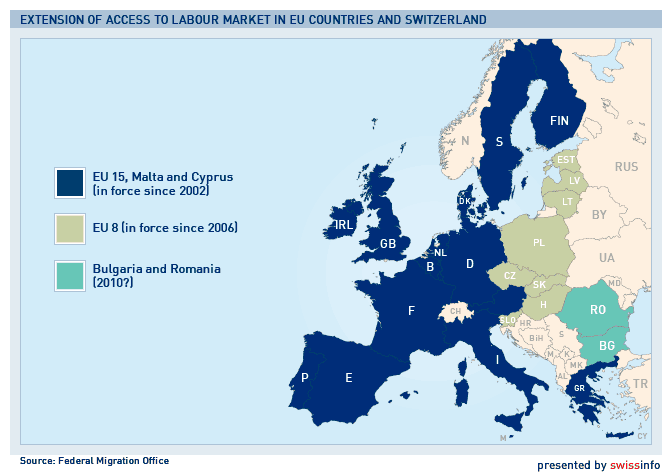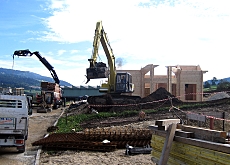Keeping the open job market clean

In Switzerland around 150 factory inspectors ensure that a labour market open to people from the European Union does not become synonymous with exploitation.
Voters decide next month whether to continue and extend an EU labour accord, which is linked to government measures to prevent salaries being undercut.
Cantons, including those on the Swiss border, are so far satisfied with the system, which will have to cope with the financial crisis.
Frédéric and Nelson work for canton Neuchâtel in northwestern Switzerland. Today their struggle against wage dumping starts in the city of Neuchâtel at a restaurant, which turns out to be closed. Because their visits are always unannounced, this is a risk of the job.
Catering, along with construction, are the sectors responsible for the most offences – and where inspectors often need to be accompanied by the police.
This isn’t necessary for their next stops – a telemarketing office and a watchmaker. That’s not to say, however, that their arrival doesn’t cause tension.
Finally it’s off to the town’s red-light district, where they are always received with smiles.
“Evening, madam. Work inspectors. Is Rosanita there?”
Rosanita (not her real name) comes from the Dominican Republic and holds a Spanish passport. This enables her to work in Switzerland for a maximum of 90 days over 12 months.
Many of her colleagues, who are Brazilian or Asian but married to Europeans, are in the same boat. Rosanita admits, sitting in her tiny flat, that she left Spain because of the economic crisis.
“I hope things will be better here – even if it’s freezing!”
Accompanying measures
When the Swiss voted in favour of opening the labour market in 2000, Neuchâtel’s cantonal work inspectorate comprised just one person. Frédéric and Nelson are now two of a six-man team, which also deals with moonlighting.
The bulk of their work involves checks, which they carry out as part of a framework of accompanying measures. These were introduced in 2004 to serve as a safeguard against wage dumping.
They had such an effect that in 2008 Brussels denounced certain measures as being protectionist.
The system appears to work, however. Last January the Swiss government and the 26 cantons said the results were positive.
“Having carried out 600 checks last year, which represents almost 3,000 employees, we have a fairly accurate picture of the situation,” said Olivier Schmid, head of Neuchâtel’s work control office.
“We’ve exposed abuse, but we haven’t noticed any wage dumping.”

More
Free movement of people
Wage dumping
In a canton where nine per cent of workers commute across the border – and where their number has almost trebled from 3,748 in 1998 to 9,446 in 2008 – this issue is on many people’s minds.
The authorities have conducted several studies. One, in 2006, established a “definite correlation” between cross-border workers and the unemployment rate. Another, a year later, refuted such a claim.
Michel Gindrat, a Neuchâtel trade unionist, will be going against the Trade Union Federation by rejecting the extension of free movement on February 8. He says wage dumping is a fact.
He believes studies into salaries, such as that carried out in the watchmaking sector this summer, are not representative because they are based on data from the Federal Statistics Office rather than real-world information.
“Jean-Claude Rennwald [a parliamentarian from the centre-left Social Democratic Party] has talked about salaries of SFr2,550 ($2,200) – around SFr600 below what is current in the sector,” he said.
Last year there were 32 disciplinary action cases and fines in the canton brought against European companies or freelancers who hadn’t made themselves known and against associations which had brought workers to Switzerland without supplying payment slips or paying them normal Swiss rates.
Litmus test
All cantons agree it is still hard to take action against companies registered abroad.
They also stress that facing a stalling economy, the litmus test is still to come.
Gindrat is more alarmist. Citing the virtual impossibility of checking freelancers and the grey zone concerning work placement agencies, he fears an increasingly tense situation.
For their part, Frédéric and Nelson don’t foresee the ranks of unemployed swelling in the event of the accompanying measures being abolished.
“If the measures aren’t put in place, it will be a waste. But there will always be checks,” they said philosophically.
swissinfo, based on an article in French by Carole Wälti
Switzerland is not a member of the EU but it has concluded 20 major bilateral agreements with the 27-nation bloc.
The labour accord, put into force in 2002 for an initial seven-year period, was extended to eight mostly eastern European countries in 2005 and is set for another extension in 2009.
Under the agreement Switzerland and the EU grant each other access to their labour markets.
The number of citizens from the EU and the European Free Trade Association (Efta) on the Swiss labour market has seen a steady increase over the past few years.
Official figures show a 2.2% increase between December 2005 and December 2006, 5.3% (2007) and 7.9% (by August 2008).
Cross-border workers accounted for about 208,000 in August 2008, up from 165,300 in 2003 (+26%).


In compliance with the JTI standards
More: SWI swissinfo.ch certified by the Journalism Trust Initiative











You can find an overview of ongoing debates with our journalists here . Please join us!
If you want to start a conversation about a topic raised in this article or want to report factual errors, email us at english@swissinfo.ch.